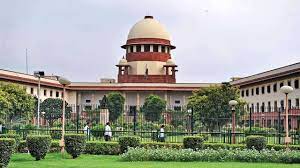CURRENT AFFAIRS
Get the most updated and recent current affair content on Padhaikaro.com
Unlawful Activities (Prevention) Act (UAPA)
- Vaid's ICS, Lucknow
- 25, Nov 2021

GS Paper II
Why in News?
A Special Bench of the Supreme Court, led by Chief Justice of India N.V. Ramana, recently protected two lawyers and a journalist booked under the Unlawful Activities (Prevention) Act (UAPA) from any “coercive action” by the Tripura police.
What’s the issue?
The lawyers had led a fact-finding mission and released a report on the “targeted political violence against Muslim minorities in the State” in October and the journalist had tweeted “Tripura is burning”. Following this a FIR was lodged against them.
What’s the concern now?
The ppetitioners have argued that the State of Tripura was “monopolising the flow of information and facts emanating from the affected areas by invoking the UAPA against members of civil society, including advocates and journalists, who have made the effort to bring facts in relation to the targeted violence in the public domain”.
Need of the hour:
The petitioners have asked the court to restrict the vague and wide definition given to what amounts to “unlawful activity” under the UAPA. The definition gave a free hand to the State to crush dissent and free speech with the threat of UAPA, it argued.
- Also, Anticipatory bail was barred under the UAPA and the possibility of bail was remote.
About the Unlawful Activities (Prevention) Act:
Passed in 1967, the law aims at effective prevention of unlawful activities associations in India.
The Act assigns absolute power to the central government, by way of which if the Centre deems an activity as unlawful then it may, by way of an Official Gazette, declare it so.
- It has death penalty and life imprisonment as highest punishments.
Key points:
Under UAPA, both Indian and foreign nationals can be charged.
- It will be applicable to the offenders in the same manner, even if crime is committed on a foreign land, outside India.
- Under the UAPA, the investigating agency can file a charge sheet in maximum 180 days after the arrests and the duration can be extended further after intimating the court.
Facts for Prelims
Kamo’oalewa:
In 2006, the PanSTARRS telescope in Hawaii spotted a quasi-satellite — a near-Earth object that orbits the Sun and yet remains close to the Earth. Scientists named it Kamo’oalewa, a word that is part of a Hawaiian chant, and alludes to an offspring that travels on its own.